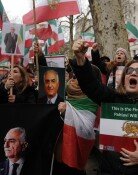Power Can Buy Peace, Bush “Powerful Influence`
Power Can Buy Peace, Bush “Powerful Influence`
Posted June. 04, 2003 22:29,
U.S. President George W. Bush, Israeli Prime Minister Ariel Sharon and Palestinian Prime Minister Mahmoud Abbas convened landmark 3 way -talks Wednesday (local time).
The talks were held in Aqaba, Jordan, the only Arab country besides Egypt that has diplomatic relations with Israel. After the talks, the three leaders crossed a bridge over the swimming pool in front of dozens of cameras and headed towards the King of Jordan`s palace. For the stage effect, clever White House operatives demanded that Jordan to build a bridge before the talks.
The bridge is not only a metaphor. The talks were held for the first time since the 3 way-talks held in Egypt in October 2002. President Bush has been on the side lines of the blood shed in the Middle East since his inauguration. However, this time, President Bush is taking an active role in the negotiations.
The bridge signifies strengthened White House influence in the Middle East since the end of the Iraq war. Both statements of Mr. Sharon and Mr. Abbas were drafted by the Americans and then amended later.
During the talks, President Bush plans to urge both parties to carry out the road map in which Israel and Palestine end the bloodshed and establish an independent Palestine state by the year 2005.
Mr. Sharon is expected to announce the closure of 12 settlements among the 65 illegal Jewish settlements along the Jordan River.
Mr. Abbas is also expected to strongly urge Palestinians to dismantle arms against Israel, the New York Times reported on Wednesday,
According to the first phase of the map, Palestinians should stop using violence against Israel, and Israelis must leave from the Jewish settlements built after March, 2001.
Israel created an amicable atmosphere by releasing about 100 Palestinian prisoners found guilty of killing a large number of Israelis as a goodwill gesture ahead of the summit.
President Bush had a summit with moderate Arab leaders at Sharm el Sheik, a coastal resort city on the Red Sea in Egypt and the leaders participating in the summit promised to support the road map towards peace.
Prime Minister Abbas, President Hosni Mubarak of Egypt, King Abdullah II of Jordan, King Hamad bin Isa of Bahrain and Crown Prince Abdullah of Saudi Arabia participated in the summit.
At the summit, President Bush emphasized the necessity for building a Palestinian state and hinted that he would support Mr. Abbas. President Bush also suggested establishing a free trade zone between the U.S. and the Middle East until 2013 to end the persistent conflict between Arab and Israel.
According to the survey conducted on Tuesday by the University of Tel Aviv, 55% of Israelis supported the road map, 29% were against it and 2% did not express their view. However, 66% of those surveyed said the road map will not be able to resolve the dispute by the year 2005 and 32% said that the road map will enable a resolution to the dispute.
Eun-Taek Hong euntack@donga.com







